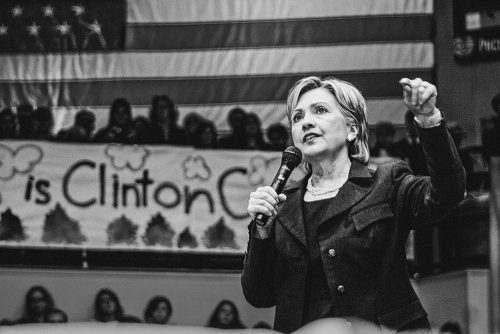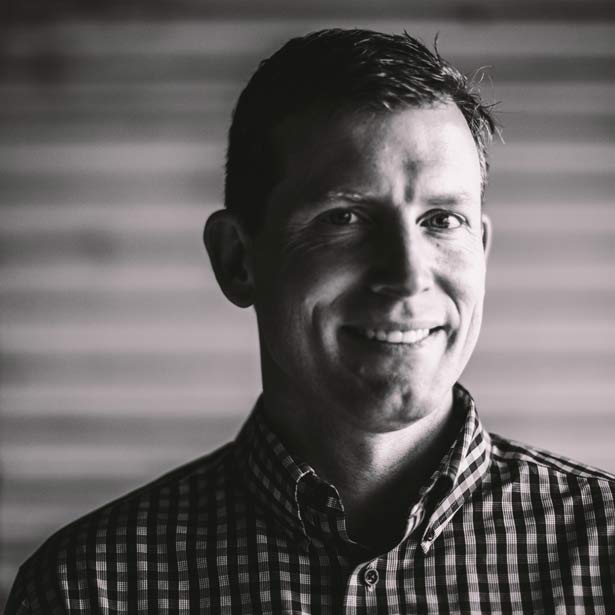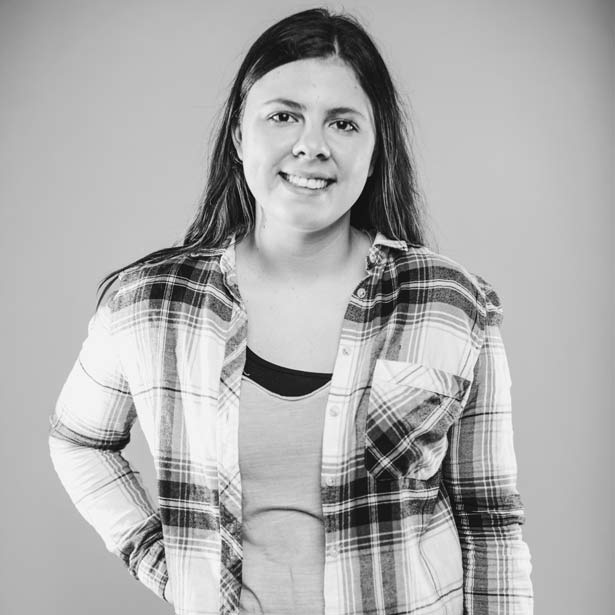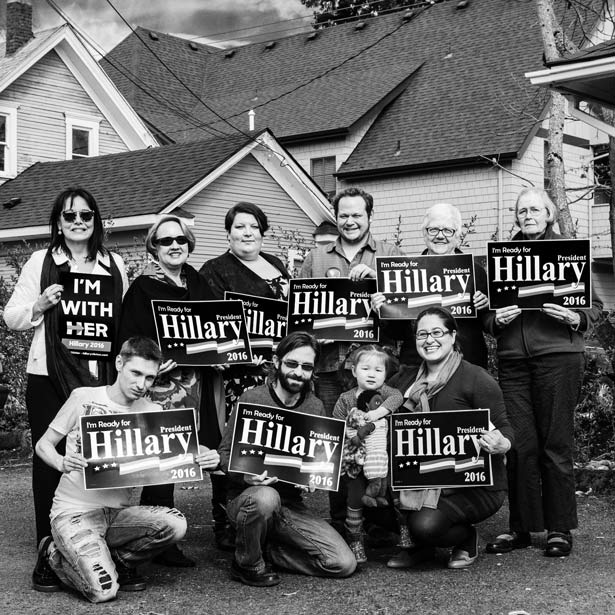
 |
| Hillary Clinton on the campaign trail in 2008 at South Eugene High School. Photo by Todd Cooper. |
Susan Cox was born in South Korea and grew up in Brownsville, Oregon with her adoptive parents. She was one of the first to serve on the Commission on Asian American and Pacific Islanders in Washington, D.C., during the first term of the Clinton administration. That’s when she met Hillary Rodham Clinton.
“The idea that Mrs. Clinton is not inspiring — I just find that astonishing,” Cox says. “When I watch her victory speeches, and she talks about what she would do, I find it very inspiring.”
Cox works for humanitarian organization Holt International in Eugene, but outside of her job, she’s on the national leadership team for Korean Americans for Hillary.
“Mrs. Clinton has always been very interested in minority populations, and in regards to the Asian-American and Pacific Islanders community, it was President [Bill] Clinton that established the first White House commission, and Mrs. Clinton was quite engaged with it,” Cox says.
This personal engagement has given Cox a lasting commitment to Hillary Clinton, one that started in the 1990s.
Cox is not alone in her support of Democratic presidential candidate Hillary Clinton. Democrats throughout Lane County are emerging to voice enthusiasm for Clinton, and while not as conspicuous as “Berners,” aka supporters of democratic socialist candidate Bernie Sanders, Clintonites can speak fervently about her winning attributes, as they often do on the “Lane County Democrats for Hillary” Facebook page, which has 147 members.
Clinton has experience, her supporters say, and she excels in foreign policy and global affairs. She’s willing to take risks as a politician, a quality that Clinton constituents say demonstrates her drive to accomplish her goals. They say that she doesn’t have a perfect track record, but when she makes mistakes, she owns up to them and moves forward better prepared.
Oregon’s primary isn’t until May 17, but nationally, Clinton has 1,214 pledged delegates to Sanders’ 911, and during the March 15 primaries, Clinton took Florida, Illinois, Missouri, North Carolina and Ohio. A Democratic candidate needs 2,383 delegates to win the nomination.
Currently, local Clintonites are phone banking and scheduling meetings to support their candidate. They say the Clinton fervor in Lane County has only just begun.
POLITICAL KNOW-HOW
Lane County Hillary Clinton supporters cite her experience in politics as key to her candidacy.
As a result of her time in office, Clinton has faced a barrage of nationwide criticism from Berners and Republicans alike. Critics say she shouldn’t have voted to go to war in Iraq, her use of a private email account lacks transparency, she’s received too many donations from corporations and Wall Street, and her husband’s extramarital activity (and her response to it) shows a lack of respect for women.
These complaints, Clintonites say, are off-base.
 |
| Marshall Wilde, member of Democratic Party of Lane County |
As far as getting cozy with Wall Street goes, “you do have to know something about these folks,” says Marty Wilde, a local Clinton supporter and member of the Democratic Party of Lane County. “She represented New York state, so she can’t be a total outsider to Wall Street. I think it helps to know those folks and know where you can get things done, and I think Wall Street knows that there are reforms that are going to happen if a Democrat goes into office.”
Wilde says Clinton’s time as first lady, as a senator and as secretary of state makes her a highly qualified presidential candidate, especially in terms of her knowledge in foreign policy, and he believes that her experience gives her a balanced approach in using the military. Other candidates, he says, fall on extreme sides of the spectrum, either wanting to use the military at full force or not use it at all.
“As president, she wouldn’t have an interventionist or activist foreign policy, but I think she would use the military appropriately,” he says.
As secretary of state, Clinton led the U.S. response to the Arab Spring, she argued in favor of the raid in Pakistan that eventually led to the killing of Osama bin Laden and she advocated for a “smart power” approach, one that supports strong military while depending on diplomacy and alliances in international relations.
Jarrod Mowatt, a Clintonite who works at Symantec, says he has appreciated the progress made during the Obama administration, and he wants to see that progress continue. Clinton is the best candidate to carry on that work, Mowatt says.
“Gay rights is something that I’ve been very concerned about, and we’ve made a lot of progress over the last several years, but I can see where we might go back if we elect the wrong person,” he says. “Hillary gave a speech in Geneva a few years ago where she said that human rights are gay rights, and that really stuck with me. These are things that I’m concerned about and I know that she is also concerned about.”
Mowatt says he also appreciates Clinton’s effort to raise funds for down-ticket Democratic candidates — Clinton has raised $18 million for the Democratic National Committee to help out other Democrats running for office, according to Politico.
“The biggest difference I see with her is the efforts she’s put in to get like-minded people put into office as well,” Mowatt says. “What I see from the other candidates is that this election is about them, but with Hillary, it’s not just about her.”
MRS. PRESIDENT
Hillary Rodham Clinton’s political career comprises a striking list of historic firsts. She is the “first” first lady of the U.S. to have a postgraduate degree and to have a professional career just prior to the time of her husband’s inauguration. She’s also the first former first lady to run for elected office and to serve in the U.S. Cabinet.
If her campaign ends in success, Clinton will add another first to that list: first woman president of the U.S.
As a presidential candidate, Clinton’s gender has undeniably played a role in her campaign — from overt sexism in reaction to her campaign to the prospect of finally seeing a female commander in chief.
Even the use of her first name has prompted discussion. Is it sexist to call her “Hillary” when Donald Trump goes by “Trump” and no one calls Ted Cruz “Ted”? Yet, Bernie Sanders goes by “Bernie.” Perhaps bringing gender into politics inevitably opens new lines of thought.
Lane County supporters say Clinton’s gender is only one of many factors that make her an ideal candidate.
“I’m not supporting her because she is a woman,” Cox says. “But I’m eager to have a qualified, competent woman in the White House. That is undeniably part of her appeal. It’s not just any woman, but this woman, and at the right time.”
 |
| Phoebe Bellisario, a member of UO for HILLARY |
Phoebe Bellisario, a sophomore in political science at the University of Oregon, says that she has experienced stereotyping: “I hear people say, ‘Oh, you’re a woman so you have to vote for Hillary,’ but I don’t think that’s the case,” she explains. “I like Hillary, and I’m not voting for her because she’s a woman. She just happens to be a woman.”
Still, Clinton fans acknowledge the significance of potentially seeing the first woman president take office.
“It would be a huge milestone for women’s rights,” Bellisario says.
Cox points out that countries around the world have had women leaders, including her birth country — South Korea currently has a female president, Park Geun-hye.
“I think about my granddaughter and daughter,” Cox says. “For that generation, when you look at pay equity and so many different issues, the glass ceiling has not been fully broken through, and having a woman in the White House is taking that next step.”
Evangelina Sundgrenz, creator of the “Lane County Democrats for Hillary” Facebook page, says that “it would be incredibly important, not just because I believe women have not been given their fair share of leadership opportunities in this country, but because of what it would mean for half our society. Our girls would see that they, too, can become president.”
WAIT YOUR TURN
In 2016, women running for president still face an onslaught of sexism, and Hillary Clinton has long been a favorite target. Her political career shows she’s no stranger to this treatment: In 1992, when Bill Clinton was running for president, a frustrated Hillary Clinton, who was working as an attorney at the time, said to reporters, “I suppose I could have stayed home and baked cookies and had teas, but what I decided to do was to fulfill my profession, which I entered before my husband was in public life.”
The comment sparked outrage from stay-at-home moms.
During this election cycle, we’ve seen Donald Trump bash Fox News reporter Megyn Kelly for having blood “coming out of her whatever”; after giving an opening statement in which she mentioned her struggle with breast cancer, former Republican presidential candidate Carly Fiorina fielded a tweet from radio show host Steve Deance, who said, “Wow … Fiorina goes full vagina right away”; and more recently, MSNBC host Joe Scarborough tweeted, “Smile. You just had a big night,” regarding Clinton’s March 15 victory speech after she won several primaries. Can we please stop telling women to smile?
The sexism inherent in these comments shows the entrenched opposition that women face. To Clinton’s Lane County supporters, it’s a source of frustration.
Sundgrenz says women in leadership positions are at a disadvantage, because society views outspoken women as aggressive or bossy. “In the same way, we see her treatment in the campaign,” she says.
Bellisario says she’s noticed an inordinate focus on Clinton’s appearance. “ I feel like the media critiques her image, the way she dresses, the way she does her hair,” she says.
Cox says she’s tired of hearing Clinton referred to as “shrill.” Clinton talks loudly, she says, but “she’s not speaking in any different volume than Bernie Sanders or any of the men who run for president.”
Clinton herself has alluded to this: “Sometimes when a woman speaks out, some people think it’s shouting,” she said last October.
“We can see how Bernie Sanders wags his finger at her and says ‘Wait your turn’ when she’s in a debate with him,” Sundgrenz says. “It’s very patriarchal.”
CLINTONITES AND BERNERS
Bernie Sanders, Clinton’s opponent for the Democratic nomination, has seen his campaign take off since announcing his candidacy last May.
Earlier this year, EW covered the fervor of local Berners (“Feel the Bern,” Feb. 18), who meet weekly and back their candidate with passionate flair.
Clinton has a solid following in Lane County, her supporters say, but the volume of enthusiasm isn’t blasted as loudly.
“It’s a quieter constituency, as inevitably it is when you have somebody who’s been around and has a reputation as a compromiser and a moderate leader as opposed to an idealist,” Wilde says. “I worry that the electorate always seems to get led down the garden path by big talkers.”
For the most part, backers of Clinton like Sanders and his ideas, but they think his ambition lies outside the realm of reality.
“There are things I might agree with in principle that are politically impossible,” Wilde explains. “Lots of politicians like to bluster and say they’re going to break up the banks and things like that, but it’s not really that simple.”
Sundgrenz says she also agrees with much of the Sanders campaign and what it stands for, but she questions his ability to work with Congress to pass bills. She points to previous debates, where she says Sanders has shown his lack of knowledge on foreign policy.
“I feel that the Bernie campaign is instrumental in bringing people out to vote and care about issues,” Sundgrenz says, “but Hillary Clinton has the leadership, and she knows how things work.”
Cox says that Sanders’ presence in the race has strengthened Clinton as a candidate, although in her view, his history as a socialist doesn’t match up with the perspective of the Democratic Party.
She recalls a debate between Hillary Clinton and Barack Obama during the 2008 election cycle. Obama talked about his plans to close Guantanamo immediately, Cox says, and Clinton answered with a more measured response.
“She knew that you couldn’t just say all those things to get in,” Cox says. “She’s only promising what she believes she can actually produce. I don’t see that from Bernie Sanders.”
 |
| Local Hillary Clinton supporters, with Susan Cox upper left, Jarrod Mowatt third from the right in the upper row, and Evangelina Sundgrenz lower right. |
HILLARY FOR LANE COUNTY
Locally, Democrats for Clinton continue to rally the troops to help her win the nomination.
Sundgrenz says local Clinton supporters hosted a number of house parties last year to kick off the campaign and get to know each other. They stay in touch through Facebook, she says, where they also coordinate virtual campaign phone banking. With Oregon’s primary still far away, Sundgrenz says one way that locals can help out the Clinton campaign is to chat with voters in states with upcoming primaries.
Bellisario, a member of the group UO for Hillary, says that a coalition of around 70 UO students have assembled online, and they plan to start meeting regularly when spring term starts.
They’re gearing up efforts to hand out literature and interact with voters on campus, Bellisario says.
There’s no official word of Hillary Clinton making a campaign visit to Oregon yet, but she spent March 22 in Seattle, and Bill Clinton stopped by Vancouver on March 21 to campaign for his wife — in a surprise move, he swung by Powell’s Books in Portland, where Gov. Kate Brown gave him a tour and endorsed Hillary Clinton for president.
Washington’s Democratic caucus takes place on March 26.
“We’re at the genesis of it all,” Cox says. “Since Oregon’s primary is so late, there’s often the notion that it doesn’t matter, but I think that we’re organizing now to say it does matter.”